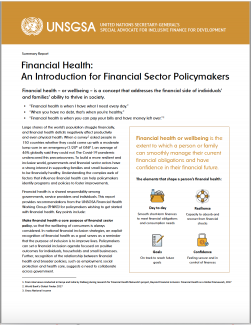
A working group on financial health convened by H.M. Queen Máxima of the Netherlands, the United Nations Secretary-General’s Special Advocate for Inclusive Finance for Development (UNSGSA), released two publications today aimed at helping policymakers understand and measure financial health, notably in the context of financial inclusion.
Financial Health: An Introduction for Financial Sector Policymakers includes a definition of financial health, why it matters for policymakers and its implications on the wellbeing of the population. (Download the two-page summary report).
As defined by the UNSGSA’s Financial Health Working Group (FHWG), financial health or wellbeing is the extent to which a person or family can successfully manage their current financial obligations and have confidence in their financial future. Four elements shape a person’s financial health, including day-to-day finances, resilience (capacity to absorb and recover from financial shocks), being in position to pursue and achieve long-term goals, and feeling secure and in control of finances.
Poor financial health is a pervasive global problem. According to the latest World Bank Global Findex (2017), most people in Africa, Latin America and South Asia report an inability to respond to a financial shock, along with significant shares of people in other regions. COVID-19 further underscored that financial health is a universal issue in both developed and emerging economies as the pandemic’s impacts exacerbated these vulnerabilities for many.
The publication explains why and how policymakers can incorporate financial health into their work. A more explicit recognition of financial health as a goal, accompanied by measurement of gaps in the financial health of the population—especially the newly financially included—can help policymakers set a financial inclusion agenda that is clearly focused on positive outcomes for individuals, households and small businesses.
UNSGSA Queen Máxima authored the foreword of the policy note, highlighting that it “can serve as a helpful starting point for financial sector policymakers to further explore the concept of financial health, and initiate additional research and knowledge exchange. A better understanding of financial health, its policy implications and its drivers can inform actions that lead to effective policy reforms.”
In the second publication, Measuring Financial Health: Concepts and Considerations, the FHWG outlines current approaches to measuring financial health and provides detailed examples for policymakers. It also offers recommendations for developing a financial health survey module containing simple, plain-language questions that can provide insight into an individual’s overall financial health, and, in the aggregate, of a population or specific group.
Additionally, as another resource, the FHWG’s subgroup of private sector members released supplemental introductory information on the business case of financial health for financial services providers, with case studies from three leading companies. Its aim is to help inform why and how to integrate the financial health of customers and employees into business strategies.
ABOUT THE FINANCIAL HEALTH WORKING GROUP (FHWG)
The Financial Health Working Group (FHWG) was convened in December 2020 by UNSGSA Queen Máxima. The group is composed of financial health experts from the public, private and non-profit sectors, and it came together to advance the focus on financial health globally. Members include representatives from the Centre for Financial Regulation and Inclusion (CENFRI), Mastercard Center for Inclusive Growth, UN Capital Development Fund (UNCDF), Consultative Group to Assist the Poor (CGAP), Commonwealth Bank of Australia, World Bank, Financial Health Network (FHN), BFA Global, Development Bank of Latin America (CAF), Aspen Institute, MetLife Foundation, and ING; as well as independent technical experts and staff members from the Office of the UNSGSA.